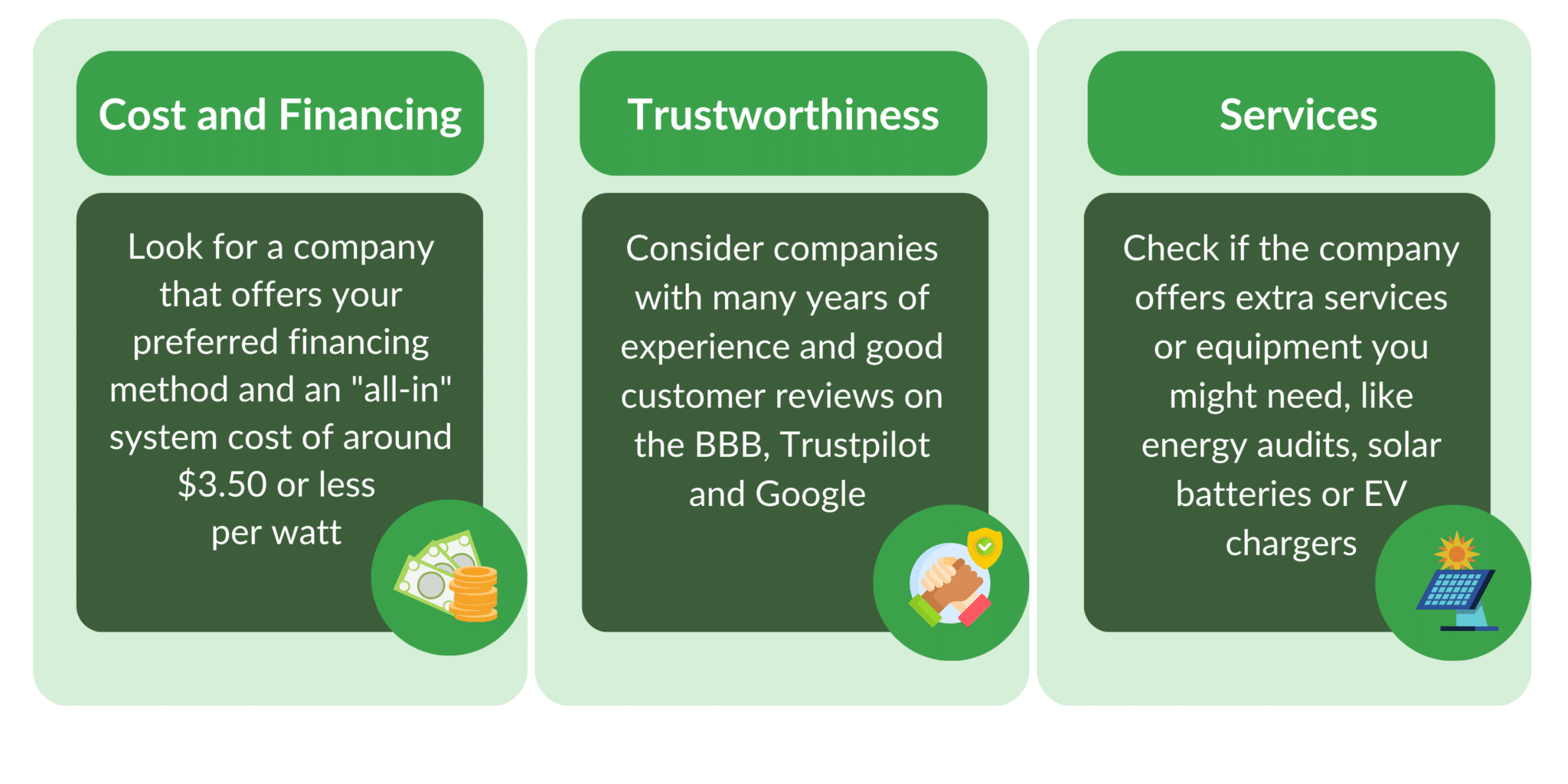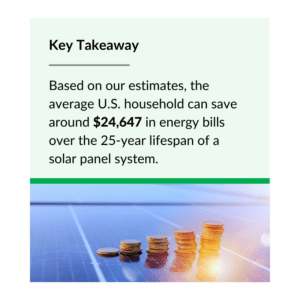Home
Blog
the-10-best-solar-companies-of-2024
The 10 Best Solar Companies of 2024
We've ranked our top picks for solar installation companies based on our detailed methodology and extensive research. Check out the solar company reviews to learn more.
Last Updated: 03/06/2024
If you want to make the switch to solar power, some of our top recommendations for solar panel installers are Ask Solar, Solar Saver Program, Solar Form Fill Leads and HQ Solar. However, every provider in this guide to the best solar companies offers a unique experience, and the best fit for you will depend on your personal needs and wants in going solar.
We at the Guides Home Team conducted surveys, spoke with industry experts, interviewed solar company representatives and evaluated each company based on our detailed solar methodology to come up with our top list of providers. Read on to learn more.

Available in all 50 states
25-year labor and equipment warranty
High-efficiency solar panels
DETAIL LEARN MORE

Offers a range of financing options
24/7 customer service line
Panel insurance protects against theft and damage
DETAIL LEARN MORE

Packages include 24/7 system monitoring
25-year warranty guarantees power production, product performance and workmanship
Installation process is handled 100% in-house
DETAIL LEARN MORE
Compare Solar Installation Companies
Compare our top-rated solar panel companies using the chart below:
Provider | Avg. Cost of a 10-kW System | Years of Experience | BBB rating | Financing Options |
|---|---|---|---|---|
$15,000–$20,000+ | 7 | A | Cash or loan | |
$15,000–$20,000 | 15 | A+ | Cash, loan, lease or PPA | |
$10,000–$15,000+ | 9 | A- | Cash or loan | |
$20,000–$25,000 | 14 | A+ | Cash or loan | |
$15,000–$20,000 | 13 | A+ | Cash or loan | |
$20,000–$25,000 | 14 | A+ | Cash or loan | |
$20,000–$25,000 | 5 | A+ | Cash or loan | |
$15,000–$20,000 | 7 | A+ | Cash or loan | |
$10,000–$15,000+ | 14 | A+ | Cash or loan | |
$15,000–$20,000 | 6 | A | Cash or loan |
*Note: Pricing data is based on responses to our March 2023 solar cost survey of 1,000 homeowners with solar systems.
Learn more about the Solar Companies >>
What To Look For in a Solar Company
When looking for a solar company, some of the most important considerations are cost and financing options, company trustworthiness, and services offered.

How To Tell if a Solar Company Is Reputable
When researching solar companies, how do you know what to watch out for?
To determine if a company is reputable, Roger Horowitz, director of Go Solar Programs at Solar United Neighbors, recommends that customers make sure to check companies'online reviews and ask for local references. He also recommends comparing quotes and warranties from at least three providers.
Horowitz warns customers:"Watch out for high-pressure sales tactics from companies that don't want you to have time to check references or reviews. In particular, non-reputable companies tend to emphasize 'special programs' available for a 'limited time.'"
At the end of the day, you won't regret doing your research and taking the time to make the right decision. You can learn more about how to spot solar scams on Solar United Neighbors'website.
How Much Does It Cost To Go Solar?
Every solar panel system is different. Multiple factors can determine how much you'll pay to go solar, including your home's location, the size of your roof, how much sunlight your roof receives, your panel brand, the solar panel installer and more.
Based on our March 2023 poll of 1,000 homeowners with solar panels, the average solar system costs between $15,001 and $20,000.
To get a personalized cost estimate, start with our solar calculator or request quotes from local installers.
Get a Quote on Your Solar Installation in 30 Seconds
On Average, Homeowners Save $5,000-$20,000 with Solar Panels
Solar Incentives and Tax Credits
If you are a U.S. resident, you are eligible to claim the federal tax credit when you install solar panels and solar accessories like backup batteries. This credit, which applies to federal taxes you owe, is worth 30% of the total cost of your solar system. Currently, the credit is scheduled to decrease to 26% in 2033 and drop to 22% in 2034 before expiring in 2035.
So if your solar panel system costs $20,000, your tax credit would be worth $6,000. If you don't owe that much in federal taxes the year you file, you can roll over the credit for up to five years.
Most states offer additional incentives and tax credits for going solar. Make sure to ask your local solar contractor about incentives in your state and how to apply.
How Much Can You Save by Going Solar?
As of January 2023, the average cost of electricity in the U.S. is 16.8 cents per kilowatt-hour (kWh), the highest ever reported by the Bureau of Labor Statistics.

If you have a solar system that generates enough electricity to meet your household's needs, you can avoid paying your full utility bills for however long your solar system is functioning. In turn, you can use these savings to pay off your system.
For example, say your solar array costs $20,000. Based on the average U.S. monthly energy bill (adjusted annually for inflation), you could pay off your system in 12 years just using the average amount you'd save on energy bills. Considering most solar panels have a minimum lifetime of 25 years, you would enjoy at least 13 years of free electricity after you've paid off your entire system.
The average U.S. household uses 10,632 kWh of energy annually, which equals $1,786 in energy bills every year . With a $20,000 system, you'd be saving a total of roughly $24,647 over the lifetime of your panels if your system offsets your energy consumption entirely, or around $13,488 if it offsets 75%. However, your return on investment when going solar could be even higher if any of the following apply:
- The cost of traditional energy where you live is higher than average
- Your state has local solar incentives and rebates
- You live in a state that receives abundant sunlight, like Arizona or California
- Your roof receives a lot of sunlight (no trees or buildings shade your roof)
